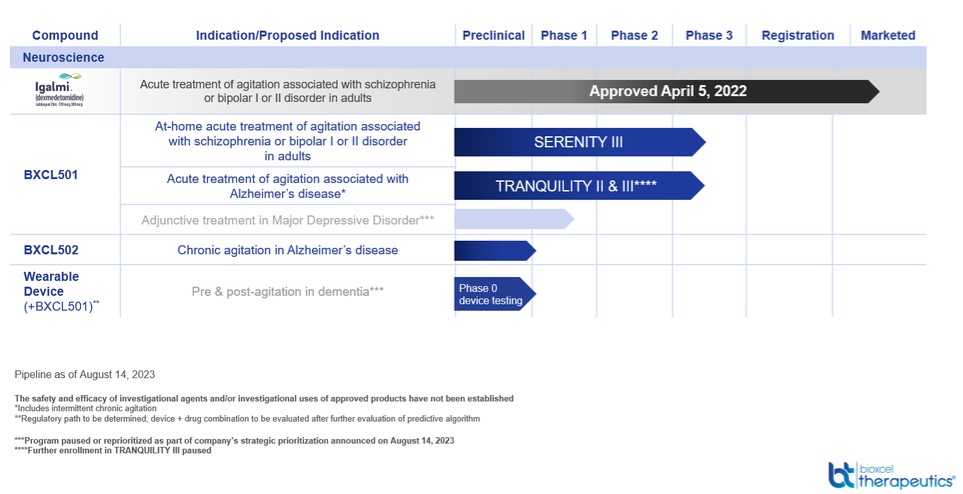Our employees may engage in misconduct or other improper activities, including noncompliance with regulatory standards and requirements and insider trading.
We are exposed to the risk of employee fraud or other misconduct. Misconduct by employees could include intentional failures to comply with any regulations applicable to us, to provide accurate information to regulatory authorities, to comply with manufacturing standards we have established, to comply with federal and state health care fraud and abuse laws and regulations, or to report financial information or data accurately or disclose unauthorized activities to us. In particular, sales, marketing and business arrangements in the health care industry are subject to extensive laws and regulations intended to prevent fraud, misconduct, kickbacks, self-dealing and other abusive practices. These laws and regulations may restrict or prohibit a wide range of pricing, discounting, marketing and promotion, sales commission, customer incentive programs and other business arrangements. Employee misconduct could also involve the improper use of information obtained during clinical trials, which could result in regulatory sanctions and serious harm to our reputation. We have adopted a Code of Business Conduct and Ethics, but it is not always possible to identify and deter employee misconduct, and the precautions we take to detect and prevent this activity may not be effective in controlling unknown or unmanaged risk.
Business interruptions could adversely affect future operations, revenues, and financial conditions, and may increase our costs and expenses.
Our operations, and those of our directors, advisors, contractors, consultants, CROs, and collaborators, could be adversely affected by earthquakes, floods, hurricanes, typhoons, extreme weather conditions, fires, water shortages, power failures, business systems failures, medical epidemics, and other natural and man-made disaster or business interruptions. Our phones, electronic devices and computer systems and those of our directors, advisors, contractors, consultants, CROs, and collaborators are vulnerable to damages, theft and accidental loss, negligence, unauthorized access, terrorism, war, electronic and telecommunications failures, and other natural and man- made disasters. Several of our employees conduct business outside of our headquarters and leased or owned facilities. These locations may be subject to additional security and other risk factors due to the limited control of our employees. If such an event as described above were to occur in the future, it may cause interruptions in our operations, delay research and development programs, clinical trials, regulatory activities, manufacturing and quality assurance activities, sales and marketing activities, hiring, training of employees and persons within associated third parties, and other business activities. For example, the loss of clinical trial data from completed or future clinical trials could result in delays in our regulatory approval efforts and significantly increase our costs to recover or reproduce the data.
Likewise, we will rely on third parties, including ARx, to manufacture IGALMI and our product candidates and to conduct clinical trials, and similar events as those described in the prior paragraph relating to their business systems, equipment and facilities could also have a material adverse effect on our business. To the extent that any disruption or security breach were to result in a loss of, or damage to, our data or applications, or inappropriate disclosure of confidential or proprietary information, we could incur liability and the further development and commercialization of our product candidate could be delayed or altogether terminated.
Data breaches or cyber-attacks could disrupt our business operations and information technology systems or those of third parties on which we rely, adversely impact our financial results, or result in the loss or exposure of confidential or sensitive product candidate, clinical trial, employee, or Company information.
Our information technology systems and those of third parties on which we rely have been and may in the future be attacked or breached by individuals or organizations intending to obtain sensitive data regarding our business, our product candidates, clinical trials or other third parties with whom we do business; harm or disrupt our business operations; or otherwise misappropriate information or Company funds. A security compromise of our information technology systems or business operations, or those of third parties on which we rely, could occur through a variety of methods such as from cyber-attacks and cyber-intrusions over the Internet, malware, computer viruses, email spoofing, attachments to e-mails, persons inside or outside our organization or persons with access to systems inside our organization. The risk of such intrusions, threats to data and information technology systems and breaches has generally increased as the number, intensity and sophistication of attempted attacks and intrusions from around the world have increased. We use our information technology systems to protect confidential or sensitive product candidate, clinical trial, employee and Company information.
